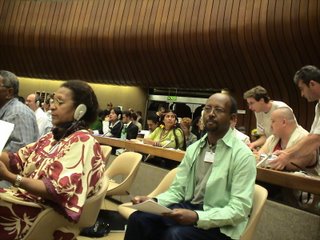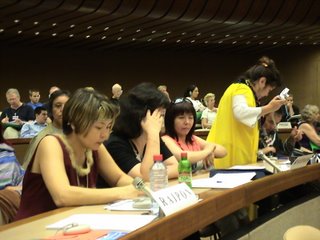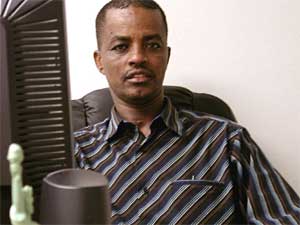



Photos from WGIP 24th Session UN Human Rights Council, by OromiaTimes
Oromo: Oral Intervention on Political Prisoners at the United Nations
31 July 2006
An Oromo representative called upon the WGIP today at the UN headquarters in Geneva to act to end the suppression of Oromos, in particular appealing for the release of Oromo Political Prisoners
Oral Intervention by Zewdu Lechissa, Unrepresented Nations and Peoples Organization (UNPO)
Working Group on Indigenous Populations Twenty-fourth Session
Item Agenda 4a, General debate;
Statement on appeal of Oromo prisoners from Ethiopia
Mr. Chairman and distinguished delegates,
Ladies and gentlemen,
I wish to avail myself this opportunity to echo to you the lamenting voice of Oromo* prisoners from Addis Ababa by directly conveying their appeal to you so that you will outreach the international community.
The appeal goes:-
“We the Oromo Political Prisoners, charged with false accusations for the crimes of attempting to overthrow the regime and inciting war, were detained and have been suffering for such a long time in prison without trial and justice only for our political outlook and being Oromo. Moreover, our human rights are always violated and we have been denied of humane treatment as a result of which we have been suffering from sickness, torture and death. Even though Article 20(1) of the FDRE Constitutaaion provides that the accused have the right to speedy trial by an independent judiciary, this constitutional right of ours has been utterly violated and our trial is excessively delayed.
Cases:
1. The trial of Tegene Gebresillasie and other 48 innocent Oromos, apprehended from the town of Adama (Nazareth) and its vicinity, has been proceeding before the Second Criminal Division of the Federal High Court since 1990 E.C. for 8 years. We have been suffering in prison during all these years.
2. The trials of Ali Ibirahim and others (48 innocent Oromos) who were apprehended from the town of Dire Dawa and its vicinity, the trial of Mohammed Hussein and others (41 innocent Oromos) who were apprehended from Arsi, Bale and East Shewa Zones of Oromia have been proceeding for the last 6 years since 1992 E.C. before the above mentioned Court.
3. The trials of Hussein Hamza and others (15 peaceful Oromos) and that of Kedir Zinabu and others (15 innocent Oromos), apprehended in East and West Hararge Zones in Oromia have been dragging since 1993 E.C. for solid 5 years before the same Court **.
4. The trial of Mesfin Ittana and others (9 innocent Oromos), apprehended in East and West Wallaga Zones of Oromia has been dragging before the same Court since 1995 E.C.
5. The trials of Diriba Damisse and others, Gameda Kasim and others, and leaders of Mecha Tulama Association (Oromo self-help association), Oromo students of Addis Ababa University and Oromo journalists (generally 59 innocent Oromos) have been proceeding since 1996 E.C. for 2 years.
6. The trials of Haile Tasisa and others (9 persons), Chala Lench and others (7 persons), Merga Negera and others (3 persons), Elias Jibiril and others (2 persons), and the trials of Olkaba Lata, Liben Jarso, and Shiferaw Hinsarmu (a journalist) have been pending before the same Court, while we all are suffering in cells without being lawfully convicted.
Contrary to Article 21(1) of the FDRE Constitution, the conditions in which we are held in prison or custody is inhumane. We have been subjected to torture, shot to death.
For instance: On October 24, 1998 E.C student Alemayehu Gerba was shot in his bed and died of this on November 1, 1998 E.C. Gadisa Hirpasa, a student and prisoner was tortured to death by prison administrators and policemen. On October 24, 1998 E.C. a police officer of the prison opened an automatic fire on a cell in which Amin Kelil, Idiris Awel, Lamessa Tasissa, Zekarias Tariku, and Ashenafi Biru were heavily wounded while in their cell and sustained incurable bodily injury. Many have become mentally deranged due to police torture. Tolera Tadesse, Umar Shek Kedir and Temam Amede have been driven close to insanity due to this torture in which they are also denied medical attention by prison officials. Others died of torture, for example, Mokonnen Zawude, Nigusu Gojera, Alemayehu Ittafa, Zelalem Bayisa, Umar Haji and Haji Mohammed Messa. We have been denied medical attention, as a result some of us are suffering from diseases. Mahammed Tayib Abdulmelik died of a disease because he was denied access to medical treatment. We fear the authorities are intentionally delaying our trial so that they get time to expose us to disease, torture and put us all to death over a longer period of time.
We demand that the torture and killing should be stopped and the murderers of students Alemayehu Gerba, and Gadisa Hirpasa, that is, Major Afework Teferra, privates Fiseha Gebremariam and Iyasu should be brought to justice immediately. Ali Ibirahim and Gutu Geletu (in 1987 E.C), Mahammed Yusuf in 1990 Sisay Debele in 1993 died of such torture while in custody. Many like Girma Ittafa became lame and unable to walk due to torture such as electric shock ***.
The ones prosecuting us for alleged crimes are public prosecutors born to Tigrian ethnic group. The presiding judge of the Second Criminal Division who simply delays our trial by adjourning our case is Le’ul Gebremariam, a Tigrian. This judge has been assigned to try Oromos since
1984 E.C. He simply orders death penalty upon Oromos ****.
Ethiopia is considered an essential partner of the USA in the “war on terrorism” and Whitehouse has generally been unwilling to apply meaningful pressure on the Ethiopian government over its human rights record.
The unparalleled genocide committed against the Oromo people by the Ethiopian regime is bound to lead to more instability of the horn. We appeal to the WGIP to call upon the Ethiopian government to:
- Stop violating the conventions and covenants which it has ratified, signed or is a state party to.
- Release Oromo political prisoners.
Thank you
_____________________________________________________________
* * The Oromos, one of the largest Cushitic indigenous groups of Horn of Africa, constitute more than 40% of Ethiopia’s’ population. They are politically marginalized since Menelik's Ethiopian Empire formation that built at the end of 1900 and destroyed Oromo social structure and installed its own. Millions were exterminated by the war of conquest, were taken away and sold into slavery. Hundreds of thousands perished by war-induced famine. Over all the consequence of conquest was genocide. Emperor Haillesillase consequently introduced laws that centralised institutions of violence against the subject people under his absolute power. 14 Provinces, 102 districts and 660 sub districts each of them with its prisons were established. The Military junta which took power in 1974 introduced over 26,000 Peasant associations and 5,000 urban dwellers associations, each with its own prison. Over 300 of these were located in Addis Ababa. All together there were over 38,000 prisons in “Socialist Ethiopia”. The current regime has inherited all these prison facilities, and in addition used former military training centres, offices, halls, and even private houses as detention centres. As the numbers of prisions are much the agony is also boundless.
** There is one and only one reason why the Second Criminal Bench of the Federal High Court has failed to dispose of our case: that is the crime we are charged with is unfounded and cannot be proved in which case we will certainly be acquitted if the court will have decide the matter. So the only mechanism by which we can be kept in prison for indefinite period is by delaying our trial. This, however, is illegal and inhumane. We therefore request the concerned Ministry of Justice to respect the country’s Constitution and provide us immediate and just solution.
*** Article 25 of the Constitution guarantees equality before the law and protects against any form of discrimination. However, we Oromos have been detained and jailed without trial, only for our political outlooks and ethnic nationality, and language. We are exposed to torture such as electric shocks. Our investigators are only Tigrian members of the Federal Police. This team is led by a man called Tadese Meseret known for using electric shocks in which many innocent Oromos lost their lives.
**** The so-called crimes that we are charged with are said to have been committed in Oromia. Constitutionally Oromia has jurisdiction to try us, but we are put to the investigation by Tigrian police, prosecution by Tigrian prosecutor and trial by a Tigrian judge before federal court in a Language which we do not understand, where we are orally abused, insulted if we demand explanation or accurate translation. So we are denied of fair trial and justice in all the processes of investigation, prosecution and trial. We could have been tried in Oromia, but we are brought before federal institutions for the purpose of discrimination.”
Source: www.unpo.org/article.php?id=5016

 Pictures from the WGIP, 31 july 2006, OromiaTimes
Pictures from the WGIP, 31 july 2006, OromiaTimes























